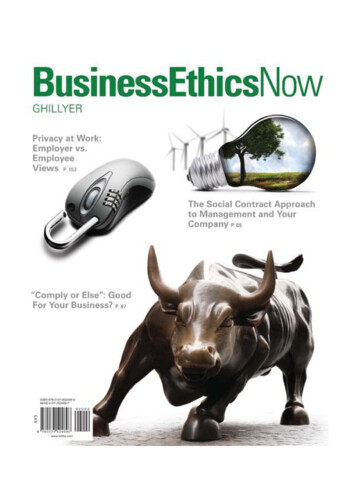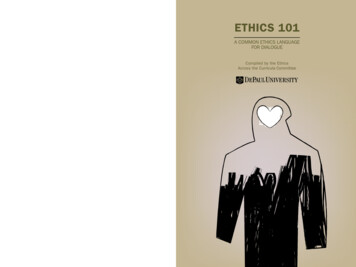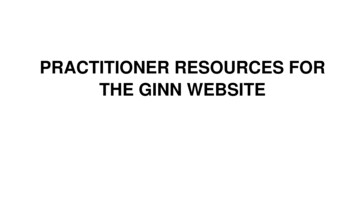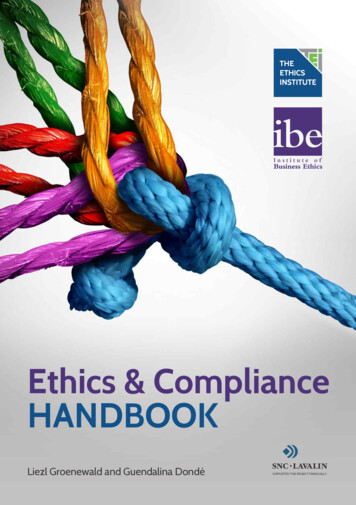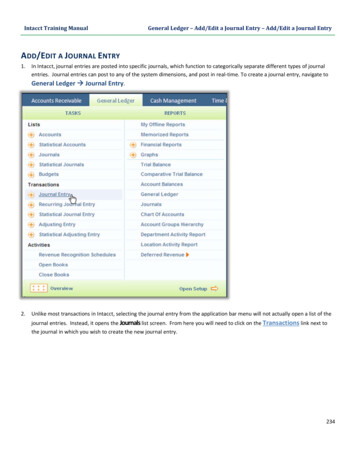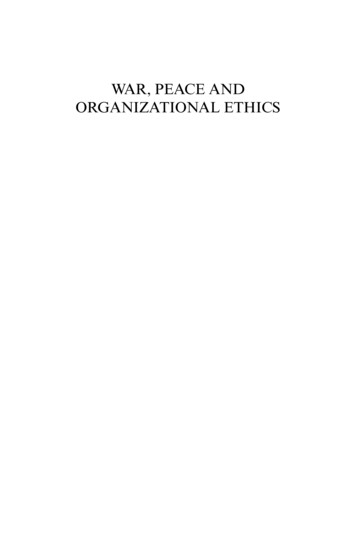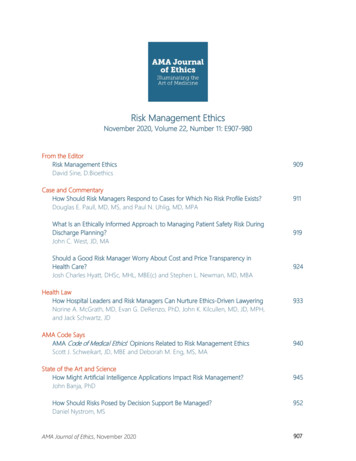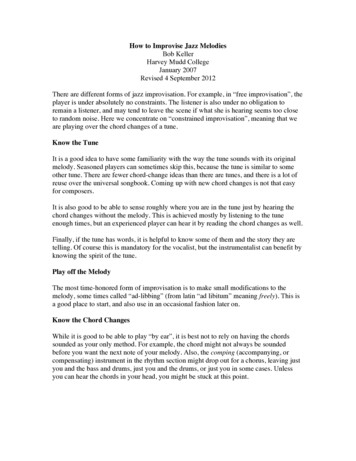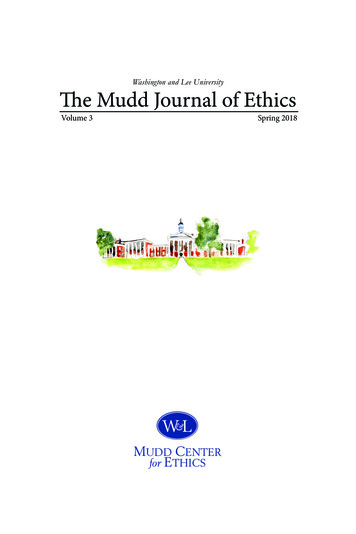
Transcription
Washington and Lee UniversityThe Mudd Journal of EthicsVolume 3Spring 2018WLMUDD CENTERfor ETHICS
The Mudd Journal Editing TeamAlex Farley ’19 (Editor-In-Chief)Rachael Miller ’18 (Assistant Editor)Kassie Scott ’18 (Assistant Editor)Kiera Judge ’18 (Assistant Editor)Sesha Carrier ’19 (Assistant Editor)Parker Robertson ’20 (Assistant Editor)Sierra Terrana ’20 (Assistant Editor)Stanton Geyer ’20 (Assistant Editor)Cover art drawn by Mary Corcoran
The Mudd Journal of Ethics Editing TeamiEditor-in-ChiefAlex Farley ’19 is a junior from Houston, Texas. He is a pursuing a double major inPhilosophy and Economics. Alex is a member of University Singers, Washington and Lee’spremier choral ensemble, and General Admissions, the university’s premier coed A Capella group. This summer, Alex is researching how social networks impact ethical leadership.After college, Alex hopes to either attend law school or graduate school for philosophy.Assistant EditorsKiera Judge ’18 is a senior from Kennett Square, PA. She is graduating with majors inPhilosophy, Economics, and Politics. She wrote her Philosophy honors thesis on practicalapplications of Henry Sidgwick’s utilitarianism. Outside of the classroom, Kiera is thePresident of Phi Sigma Tau Philosophy Honors Society, a member of Pi Beta Phi Fraternity for Women, and served as the President of Washington and Lee’s Moot Court team.Rachael Miller ’18 is a senior Philosophy and Japanese double major from Corning,New York. In her four years of Washington and Lee, she has been an active participant ofthe Mudd Center, and has served as an editor on the Mudd Journal of Ethics twice. Sheintends to pursue a Doctorate of Philosophy following a brief break from her studies — although her philosophical specialty is more inclined toward metaphysics and epistemology.Kassie Scott ’18 is a senior from Pennsville, New Jersey. She has majors in English andSociology with a minor in Poverty and Human Capability Studies. She is a member ofPhi Beta Kappa, Omicron Delta Kappa, and Alpha Kappa Delta. In addition to studying abroad in London as a US-UK Fulbright Summer Institute recipient, Kassie has alsoworked abroad in Romania. She first served as a human rights intern to a nongovernmental organization and later conducted ethnographic research on housing rights. Aftergraduation, Kassie hopes to pursue a Ph.D. in Social Policy.Sesha Carrier ’19 is a junior Philosophy major and Film and Visual Studies minor fromOregon. This was her first year volunteering her services as an editor for the MuddJournal of Ethics, but she has plenty of experience curating academic journals as the editor-in-chief of The Stone, Washington and Lee’s interdisciplinary academic journal. Bearing a strong passion for healing and caregiving, she intends to pursue a Master’s Degree inPsychotherapy pending her graduation from Washington and Lee.Stanton Lawes Geyer ’20 is a sophomore at Washington and Lee University majoring inGlobal Politics and minoring in both Philosophy and Middle East & South Asian Studieswith an Arabic concentration. In high school Stanton participated in and helped lead hischoir and cross country teams. Stanton has continued pursuing extracurricular intereststhrough the Mudd Journal, Amnesty International at W&L, and the Association for Middle East Interests. He hopes to explore questions in critical theory and sociology beforeand after graduating in 2020.Parker Robertson ’20 is a sophomore from Bend, OR. In high school, he led a staff of80 students as Editor-in-Chief of the school newspaper. At Washington and Lee, he isinvolved in the Williams Investment Society and the Real Estate Society. He is also the
iiThe Mudd Journal of Ethicsmanaging editor of the Stone, an interdisciplinary academic journal published annually.Additionally, Parker is a peer counselor, a member of Amnesty International, and a member of Kathekon. He plans to graduate with a double major in Business Administrationand German with a minor in Philosophy.Sierra Terrana ’20 is a sophomore from Tampa, Florida. She is majoring in English andminoring in Middle Eastern and South Asian Studies with an Arabic language emphasis.Sierra will spend this summer studying Arabic language and culture in Amman, Jordan,and the upcoming fall semester in Beirut, Lebanon at the American University of Beirut.After graduating, she hopes to attend law school and pursue a career in internationalrelations.
iiiAbout the Roger Mudd Center for EthicsThe Roger Mudd Center of Ethics was established in 2010 through a gift to the Universityfrom award-winning journalist Roger Mudd. When he made his gift, Mudd said, “Giventhe state of ethics in our current culture, this seems a fitting time to endow a center for thestudy of ethics, and my university is its fitting home.”Today, the Mudd Center furthers that study of ethics by organizing rigorous, interdisciplinary programming. In addition to welcoming distinguished lecturers throughout theyear to speak on ethical issues, the Mudd Center also sponsors and organizes ethics-basedconferences, professional ethics institutes, and other public events that further discussionand thought about ethics among students, faculty, and staff at Washington and Lee University and beyond.About Roger MuddRoger Mudd graduated from Washington and Lee University with a degree in Historyin 1950. Mudd’s distinguished career in television journalism includes positions at CBS,NBC, PBS, and the History Channel. He has won five Emmy Awards, two George FosterPeabody Awards, and the Joan S. Barone Award for Distinguished Washington Reporting.Mudd serves on the board of the Virginia Foundation for Independent Colleges (VFIC)and helped establish the VFIC Ethics Bowl, an annual competition in which teams fromVirginia’s private colleges and universities debate ethical issues. He is also a member of theadvisory committee for Washington and Lee’s department of Journalism and Mass Communications and an honored benefactor of Washington and Lee.
ivThe Mudd Journal of EthicsLetter from the EditorOn March 10, 2018, three undergraduate students traveled to Washington and Lee University to deliver papers on a wide variety of ethical issues, ranging from what our attitudesshould be toward death to whether people are morally obligated to protect their epigeneticsto ensure a healthy genome for their children.By all accounts, the third annual Mudd Undergraduate Conference in Ethics was a tremendous success. The papers presented and the ethical ideas contained within these paperswere of excellent academic quality. Furthermore, and perhaps most importantly, the discussion generated from each paper was insightful and thought provoking, impacting both thespeakers and the audience members in attendance. I firmly believe that philosophy is not afield of study meant for solitary engagement, but rather a field whose potential is only fullyrealized when individuals thoughtfully connect with one another. As such, it is accurate tosay that at this conference, robust philosophizing occurred.The third annual publication of The Mudd Journal represents our attempt to bringthis act of philosophizing to our readers and allow for the continuation of these importantdiscussions among our readers. While covering a wide-array of topics, these papers all seekto do the same thing: make the reader pause, think, and reflect. Essays on multiculturalism,non-dual awareness, and immortality call us to reflect and think critically about both theway in which we view the world and our existence in the world. Essays on the moral duty ofschools and journalistic objectivity force us to question our current institutions and considerwhat we demand of these societal systems. Finally, essays on epigenetics and neo-Machiavellian consequentialism make us reflect on what we consider an ethical life and moral acts tobe. We are eager to publish all of these excellent works in our journal.The Mudd Journal of Ethics is a product of extraordinary effort on behalf of numerousindividuals whom I would be remiss not to thank. Debra Frein of the Mudd Center helpedmake our conference possible and has been just as valuable to the publication of this journal.Mary Woodson and Denise Watts of the Publications office at Washington and Lee haveboth been essential in our effort to create an attractive journal that we are proud to publish.As well, I am incredibly thankful for the editors of the journal who read each of the papersubmissions, provided thoughtful feedback, and proposed useful edits and alterations. Iwant to thank each of them: Rachael Miller, Kassie Scott, Kiera Judge, Sesha Carrier, ParkerRobertson, Sierra Terrana, and Stanton Geyer. Without them, and without all of the previously mentioned individuals, this journal would not have been possible.Finally, I would like to thank Dr. Angela Smith, Director of the Mudd Center for Ethics,who really made the third volume of this journal possible. Her unending support, guidinghand, and enthusiastic commitment made both the hosting of the conference and publishing of this journal possible. I am incredibly thankful for Dr. Smith’s guidance and profoundwisdom.I hope that the reader will enjoy this excellent collection of ethics-based scholarshipfrom undergraduate philosophers across the country. Take your time as you read; pause,think, and reflect. Each paper’s ideas are important, and we are honored to present themhere, in this third volume of The Mudd Journal.Sincerely,Alex Farley ’19Editor-in-Chief
vTable of ContentsPapers Presented at the Conference“Death, Dying, and Neglected Gardens:Exploring the Ethical Consequences of Immortality” .1Gael Bemis, Smith College“Taking Pythagoras to Dinner, or,the Ethics of Journalistic Objectivity” .7Chris Larson, University of Central Florida“Preventing Obesity in the Next Generation Today:An Epigenetic Approach” . 13Austin Kinne, Washington and Lee UniversityAdditional Papers“Aristotle and the Voucher System” . 21Jake Shanley, Baylor University“Nondual Awareness: A Path Towards a More Compassionate Ethics”. 28Staysi Rosario, Georgetown University“Medical Care and Multiculturalism” . 36Sophie Morse, University of Washington“A New Necessity for Consequentialismand a New Consequentialism for Necessity” . 43Samuel Foer, University of Rhode Island
viThe Mudd Journal of Ethics
1Death, Dying, and Neglected Gardens:Exploring the Ethical Consequences of ImmortalityGael Bemis, Smith CollegeAbstract: As transhumanist philosophy begins to integrate new technologies of biologicalenhancement, life extension, and anti-ageing therapies, the quest for immortality has become increasingly relevant. Through a discussion of the value assignments socially givento life and death, and the implications these values have for core principles of bioethics, Iseek to expose the ethical weakness in advocating for immortal therapies. I draw primarily on John Hardwig’s controversial proposal of a “duty to die,” and mortality ethics aspresented by the members of the 2003 President’s Council on Bioethics, in my critique ofimmortal advocacy. I consider bioethicist John Harris’s argument for promoting immortaltherapies, and propose that a justification for immortality as he presents it is rooted in socially established fearful and isolationist narrative. In response, I call for dissociating fromsuch a narrative that devalues mortality, and assert that life and death cannot be ethicallypolarized. Additionally, I argue that it is immoral to advocate for immortal therapies, asdoing so chafes against all established bioethical principles.“The meaning of life is that it stops.”Franz KafkaAmong the most taught French literary works is Voltaire’s 1759 work Candide: or, Optimism, a satirical novella known for both its obscenity and its powerful philosophicalideas. Having been raised in a joyful utopia, main character Candide knows the pleasuresof life in his own Eden. After an adult life experiencing human misery of the worst kind,Candide abandons true optimism, but wrestles with his continued love of life—he asksof humankind why it endures such pain. Is anything more stupid, he wonders, than “tohold existence in horror, and yet to cling to it?”1 Candide is not alone in his confusion;this question, likely as old as human suffering itself, is a central struggle of medicine. Topractice medicine is to become substantially invested in the lives and well-being of otherhumans; medicine calls for healing of the horrors of existing, asks us to locate pain andassuage it. To practice bioethics, however, is to ask why, and with what purpose, healingoccurs. The bioethicist is called to determine whether, and to what end, human manipulation or intervention should exist. In the face of an ever-advancing conversation ofimmortality, this is a task that necessitates an examination of the fantasy that drives suchdialogue. Every fantasy or ideal is rooted in a narrative, providing reasoning for what isdesired. This reasoning is ethically important to dissect and name, because right action isseated within the context of right thought and right desires. The social narrative surrounding death has provided reasoning for both advocating and defending a quest forimmortality. In acknowledging and separating from this narrative, it is possible to seewhat it consists of, and what underlies the reasoning. From an analysis of the struggle with1Voltaire, Candide, trans. Shane Weller (New York: Dover, 1993).
2The Mudd Journal of Ethicsfinitude, we can begin not only to answer Candide’s insistent question, but understandwhy he asks it.The intent of this essay is not to seek an understanding of death itself, but the socialcloth in which it is dressed. Death is not purely scientific or factual; it exists within a builtsocial context, which by nature can change and vary. To understand this context and theways in which it informs bioethics, this essay proceeds in three parts beginning with (1)brief consideration of value assumptions placed on life versus death, followed by (2) anaccount of the ways in which pursuing immortality is dissonant with the five core principles of bioethics, concluding with (3) comment on what pursuing therapeutic treatment ofmortality itself exposes about medicine. The primary argument for life-extending therapies will be addressed as presented in John Harris’s 2004 publication “Immortal Ethics,” awide defense of his large body of work advocating for life extension and immortality. Toilluminate issues in Harris’s argument, I will also reference John Hardwig’s argument of aduty to die in his 2007 publication “Dying at the Right Time: Reflections on (Un)AssistedSuicide,” and the exploration of life and death as presented in the 2003 report of the President’s Council on Bioethics, Beyond Therapy: Biotechnology and the Pursuit of Happiness,especially within chapter four, “Ageless Bodies.” Moving beyond a reductio ad absurdum2of immortality, I aim to construct an approach that exposes what is unethical about pursuing immortality in the first place.The ethical starting point for an advocate of immortality is that death is bad, and lifeis good. There are many theoretical justifications for concluding that death is bad, withdeprivationism as the standard view.3 Deprivationism establishes that death is an evilbecause a loss is incurred: We are deprived of future pleasures and experiences by thefinitude of death. Arguments that address the badness of death in other ways, such as inits processes or the circumstances of its occurrence, have certainly been made.4 However,immortality as a response to the badness of death most directly responds to implicationsof life’s finitude. If life is good in that it includes pleasurable or desirable experiences, theconclusion of those who would advocate for immortality is clear: More of a good thingis better. Yet, as any indulgent child knows, the second chocolate bar has different valuethan the fifth, or the 15th. Much like the experience of eating chocolate, the chronologicaland cumulative experience of living cannot be categorized into distinct units of standardpleasure or goodness.5 From the knowledge that an experience is good, it does not followthat more will be just as good, or even be good at all. Even from the knowledge that deathmay cause pain or unpleasantness, it does not follow that death itself is an evil. Neither lifenor death lend themselves to the experience of being ethically inflexible and polarized.With the understanding of life and death as ethically relative, it is possible to see thattheir relativity is also social. The ethical value of a death, or life, of one person is defined2Specifically, in reference to Harris’s implication that such an argument is insufficient, p. 527 ofJohn Harris, “Immortal Ethics,” Ethics and Health Policy Ethics, Health Policy and (Anti-) Aging:Mixed Blessings, 2012.3Carl Tollef Solberg and Espen Gamlund, “The badness of death and priorities in health,” BMCMedical Ethics 17, no. 1 (2016).4Ibid5“Ageless Bodies,” The President’s Council on Bioethics, “Beyond Therapy: Biotechnology andthe Pursuit of Happiness,” PsycEXTRA Dataset, October 2003.
Death, Dying, and Neglected Gardens3not just by that person but by their community. As Hardwig observes, the dialogue ofdeath often rests on a false assumption that death is something that comes “only to thosewho are all alone.”6 A death is made up of many parts beyond the individual, includingthe grief or relief of others, which is often a function of the death’s timing. It is possible,suggests Hardwig, for a death to come too late—an unpopular thought, uncomfortable formany.7 Those who would be better off dead are not necessarily people in pain, experiencing illness, or lacking something that medicine can provide. Those who would be betteroff dead, Hardwig argues further, may not even want to die. Emphasis on an individual’s desires to the exclusion of their social dependence ignores the fact that we may berequired, out of duty or obligation, to do something we may not want to do but wouldbenefit others. It is Hardwig’s view that sometimes, this task may be death. Advocating forimmortality is in many ways composed from an isolationist delusion, where one individual’s desire for life and perception of the goodness of their existence is weighted to theexclusion of any social consequences.The bioethical principles of beneficence and nonmaleficence illustrate how the socially ignorant basis of immortality is not only nearsighted, but in direct opposition to bioethical standards of right action. Beneficence as the active promotion of good and well-beingfor others, and nonmaleficence as the active avoidance of harming others, both outlineloose standards of behavior for individuals.8 Together they request that an individualknow what is good or harmful for others, and that they use that knowledge to inform theiractions. While it may be difficult to think that one’s death could be substantially beneficial to others, or that one’s life could be substantially harmful to others, this is a reality ofhuman beings’ social existence. In what situations would the mortality of an individual besubstantially beneficial to others? Hardwig’s duty to die is discussed in the context of physician-assisted suicide, disease, senescence9, and burdened loved ones. However, it is notonly the obligations of diminished health that can constitute social value of one’s death.Human mortality, the authors of Beyond Therapy acknowledge, accounts for certain socialgoods: It allows for the exercise of reproduction, enables reallocation of scarce resources,establishes the value of time to come and time spent, and prevents cultural stagnation.Generational shifts enable an understanding of life’s forward movement, in a way thatclocks or calendars cannot. “Cultural time is not chronological time”10 — and the divisionbetween cultural hours may very well be the deaths and births that allow for turnover ofideas, memories, perceptions, and experiences. To promote good for and avoid harmingothers, it is necessary to acknowledge the net good done to others in the event of one’sdeath, and the relative harm done in its absence. To advocate for immortality, as a bioethicist, is dismissive of these social obligations.Considering the social goods brought about by mortality, immortality raises concerns61997).7John Hardwig, “Is There a Duty to Die?” The Hastings Center Report 27, no. 2 (March 4,IbidDefinition of bioethical principles as used can be found on p 10, Vaughn, Lewis. Bioethics:principles, issues, and cases. New York; Oxford: Oxford University Press, 2017.9Used here in the biological definition: age-related physical deterioration of life forms10“Ageless Bodies,” The President’s Council on Bioethics, “Beyond Therapy: Biotechnology andthe Pursuit of Happiness,” PsycEXTRA Dataset, October 2003.8
4The Mudd Journal of Ethicsof utility and aggregate welfare. Resources are scarce, and the social structure establishedby mortality accounts for some of life’s goodness. If every individual, or even just most,were to be immortal, the fabric of the world we live in would change drastically enoughthat immortality would no longer look like what it was imagined to be by those who choseit. These concerns lead the authors of Beyond Therapy to conclude that drastically extended lifespan or immortality may be a sort of cultural “tragedy of the commons”11—whileit may be an exciting prospect for an individual to have a leg up on the amount of timethey are able to spend learning, experiencing, and synthesizing the world, such a reality isonly a gift when it is relatively unique. In response to these concerns of utility and justicewithin immortal therapies, Harris is not troubled. Resting on the assumption that cost,risk, and other access barriers will prevent most people from attaining status as immortals,he envisions a world where mortals and immortals live in harmony.12 Harris acknowledges that access to immortalizing therapies will likely exacerbate pre-existing inequities;however, this does not create for him any obligation to reconsider pursuing immortality.Regrettable as it is, immortality would be a palpable good just like any other services ofhealth care, for which it would be ethically impermissible to deny access to some in lieu ofthe ability to provide access to all.13 Harris both expects and accepts a lack of distributivejustice, relying on access barriers to contain the population of immortals. It is one thing toacknowledge individual limits in the enacting justice, such that the pursuit of equality forothers does not constitute undue burden or require supererogatory action. It is anotherthing entirely to rely on and passively accept injustice to avoid addressing concerns ofutility.Where justice, selflessness, and utility have opposed the ethical basis of a quest forimmortality, it might be expected that autonomy would be a more forgiving bioethicalprinciple. Surely what is a bit selfish, unjust, or impractical about idealizing immortalitymay take shelter in the right to self-determination granted by the autonomy principle.Yet, this is not the case. “Ageless Bodies” contemplates not only the social consequencesof postponing or eliminating death, but the individual consequences as well. It addressesbirth and death through their contrast dependency, tracing the arc of the human life assomething both created and destroyed.14 Dreams and the urgency with which they arepursed are suggested as dependent on the inevitability of death. Pressures for euthanasia and suicide, especially in the event of chronic illness whilst immortal, are raised asconcerns for the individual’s ability to direct their own life.15 Freedom to procreate, and respect for one’s ability to derive meaning and purpose from procreation, are also central torespect of autonomy. What becomes of these ways in which death seems to bless life, andgive it clarity? For Harris, nothing. Death continues to be merely an obstacle, a disability,for which any goodness it provides the individual would be greatly outweighed by its elim-11Hardin, Garrett. “The Tragedy of the Commons.” Science162, no. 3859 (December 13, 1968):1243-248.12John Harris, “Immortal Ethics,” Ethics and Health Policy Ethics, Health Policy and (Anti-)Aging: Mixed Blessings, 2012.13Ibid, 52914“Ageless Bodies,” The President’s Council on Bioethics, “Beyond Therapy: Biotechnology andthe Pursuit of Happiness,” PsycEXTRA Dataset, October 2003.15Ibid
Death, Dying, and Neglected Gardens5ination.16 There is a paternalistic quality to such ignorance—to assume there is nothingcentral about life, for anyone, which depends on death for its significance, so they will bebetter off without it. Much like a physician is expected not to decide a course of action fortheir patients based on what they themselves fear, bioethicists should not construct ethicalarguments that assume their anxieties are ubiquitous. It is ethically concerning to impartblindness on all because of what one cannot see for themselves.Throughout “Ageless Bodies” is a sober tone of caution underlying pervasive optimism. Addressing age within the sphere of medicine brings with it implications that couldhave undesirable consequences. What does it mean to consider what would otherwise bea whole, healthy, ideal human life as a problem to be solved simply because the life wasfinite?17 The members of the Bioethical Council warn that immortality will not absolvehumans of the need to wrestle with purpose, meaning, or time. It is a given of Harris’s argument for ethical permissibility of immortality that all people desire life, at any cost, andfear death. What does it mean, for the purpose of medicine, that people would desire lifeat any cost? Is this pervasive fear of life’s end justified? Must the principles of bioethics besacrificed in the face of fear, of lacking control? In the introduction of their topic choice—biotechnology and enhancement therapies—the authors of Beyond Therapy discuss RenéDescartes’ visions for a medicine of the future: one where man would be “like masters andowners of nature.”18 It is from this vision of medicine—one which owns life and seeks tomaster it—that the weakness of a narrative that devalues mortality is illuminated.The quest for immortality does more than chafe against every tenet of bioethics; itprovides opportunity to flex one’s logic muscles in untangling the convoluted assumptionsdevaluing mortality. Such a pursuit ignores that nothing about this world is immortal—nothing that humans depend on—not the earth, not space, not time, no element of thisexistence as we know it. Advocates of immortality seek to control what is outside thescope of human influence, scrambling madly in the face of the unknown, cowering in fearand avoidance rather than seeking acceptance. The quest for immortality in itself revealsa weakness in humanity that is problematic in what it implies. The badness of death as astarting place for bioethics and for medicine limits the practice of healing and the abilityto sufficiently alleviate suffering. It is not weak to accept that humankind may have physical limits or that life ends. What is weak is to fear this observation, and clamp down onlife with a grip so tight it strangles anything delicate. It is “better surely,” muses Harris inthe concluding statements of “Immortal Ethics,” to match the “scientific race to achieveimmortality” with a parallel race in ethics to keep apace.19 Ethics, however, moves not withvelocity fueled by fear, but with careful purpose and thorough inquiry. It is not the taskof ethics to justify social fears and weaknesses on the descriptive plane, but to transcendthese, deducing and challenging their normative roots.16John Harris, “Immortal Ethics,” Ethics and Health Policy Ethics, Health Policy and (Anti-)Aging: Mixed Blessings, 2012: 53117“Ageless Bodies,” The President’s Council on Bioethics, “Beyond Therapy: Biotechnology andthe Pursuit of Happiness,” PsycEXTRA Dataset, October 2003.18“Biotechnology and the Pursuit of Happiness,” The President’s Council on Bioethics, “BeyondTherapy: Biotechnology and the Pursuit of Happiness,” PsycEXTRA Dataset, October 2003.19John Harris, “Immortal Ethics,” Ethics and Health Policy Ethics, Health Policy and (Anti-)Aging: Mixed Blessings, 2012: 533
6The Mudd Journal of EthicsVoltaire concludes his novella with a return to the land: We meet Candide in Eden,and we leave him in a field of crops. He tends to his plot ut operaretur eum; driven withpurpose, no longer fearing the world which he knows now to be full of pain. On occasion,we’re told, Candide’s mentor would remind him of the pain he endured in his lifetime andrationalize the experiences. “That is very well put,” Candide would patiently reply, “but wemust go and work our garden.”20 And so they would. As in all gardens—whether they beof crops, flowers, or of the fruits and labors of our own lives—there are seasons, the deathof one necessary for the birth of the next. As in all gardens, the tenderness with whichone nurtures the bloom of spring earns its sweetness from the understanding that it willexpire.ReferencesHardin, Garrett. “The Tragedy of the Commons.” Science 162, no. 3859 (December 13,1968): 1243-248.Hardwig, John. “Is There a Duty to Die?” The Hastings Center Report 27, no. 2 (March 4,1997): 34-42.Harris, John. “Immortal Ethics.” Ethics and Health Policy Ethics, Health Policy and (Anti)Aging: Mixed Blessings, 2012, 189-96.Solberg, Carl Tollef, and Espen Gamlund. “T
The Roger Mudd Center of Ethics was established in 2010 through a gift to the University from award-winning journalist Roger Mudd. When he made his gift, Mudd said, "Given the state of ethics in our current culture, this seems a fitting time to endow a center for the study of ethics, and my university is its fitting home."



